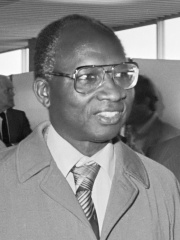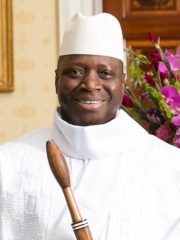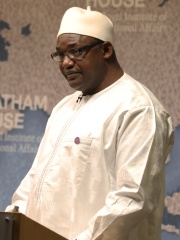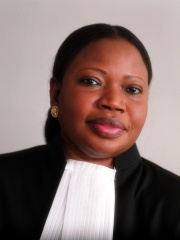



The Most Famous
POLITICIANS from The Gambia
This page contains a list of the greatest Gambian Politicians. The pantheon dataset contains 19,576 Politicians, 5 of which were born in The Gambia. This makes The Gambia the birth place of the 192nd most number of Politicians behind Samoa, and Brunei.
Top 5
The following people are considered by Pantheon to be the most legendary Gambian Politicians of all time. This list of famous Gambian Politicians is sorted by HPI (Historical Popularity Index), a metric that aggregates information on a biography's online popularity.

1. Dawda Jawara (1924 - 2019)
With an HPI of 63.09, Dawda Jawara is the most famous Gambian Politician. His biography has been translated into 41 different languages on wikipedia.
Sir Dawda Kairaba Jawara (16 May 1924 – 27 August 2019) was a Gambian politician who served as prime minister from 1962 to 1970, and then as the first President of The Gambia from 1970 to 1994, when he was overthrown by Yahya Jammeh. Jawara was born in Barajally, MacCarthy Island Division, now the Central River Region. He was the son of Mamma Fatty and Almami Jawara. He was educated at the Methodist Boys' School in Banjul (Bathurst) and then attended Achimota College in the Gold Coast (now Ghana). He trained as a veterinary surgeon at the University of Glasgow's School of Veterinary Medicine, then completed his training at the University of Liverpool and the University of Edinburgh. He returned to The Gambia in 1953 and married Augusta Mahoney, beginning work as a veterinary officer. He entered politics and became secretary of the new People's Progressive Party (PPP) and was elected to the House of Representatives at the 1960 election. He became the leader of the PPP and then the country's first prime minister in 1962, only the second-ever head of government following Pierre Sarr N'Jie's term as Chief Minister. Under Jawara, The Gambia gained independence from the United Kingdom in 1965. He remained as prime minister and Elizabeth II remained as head of state as Queen of The Gambia. In 1970, The Gambia became a republic, and Jawara was elected as its first president. The greatest challenge to Jawara's power came in 1981 when an attempted coup d'état took place and soldiers from neighbouring Senegal were forced to intervene, with 400 to 800 deaths reported by the end of the coup attempt. Following the coup attempt, Jawara and Senegalese President Abdou Diouf announced the creation of the Senegambia Confederation, but it proved to be short-lived and ultimately collapsed eight years later in 1989. Jawara continued to rule until 1994 when a coup d'état led by Yahya Jammeh seized power. Following this, he went into exile, but returned in 2002, and lived in retirement in The Gambia until his death in 2019.

2. Yahya Jammeh (b. 1965)
With an HPI of 62.95, Yahya Jammeh is the 2nd most famous Gambian Politician. His biography has been translated into 62 different languages.
Yahya Abdul-Aziz Jemus Junkung Jammeh (born 25 May 1965) is a Gambian politician and former soldier, who served as President of the Gambia from 1996 to 2017. He was the Chairman of the Armed Forces Provisional Ruling Council (AFPRC) from 1994 to 1996. Jammeh was born in Kanilai, in West Coast Region of the Gambia, and is a Muslim of the Jola ethnic group. He attended Gambia High School in Banjul from 1978 to 1983 and served in the Gambian National Gendarmerie from 1984 to 1989. He was then commissioned as an officer of the Gambian National Army, commanding the Military Police from 1992 to 1994. In July 1994, he came to power by leading a bloodless coup d'état that overthrew the elected government of Sir Dawda Jawara. At first ruling by decree, he was elected president in the 1996 election. Jammeh was re-elected as president in 2001, 2006 and 2011, but lost to Adama Barrow in 2016. His presidency oversaw a shift towards authoritarianism, demonstrated in particular by his policies towards anti-government journalists, LGBT+ people and opposition parties. His foreign policy led to constant difficulties with the country's sole neighbour, Senegal. In 2013, Jammeh withdrew the Gambia from the Commonwealth of Nations and in 2016 he began the process of withdrawing the country from the International Criminal Court, one year after he declared the nation an Islamic republic. All three decisions were later rescinded by his successor's government, despite Jammeh's supporters arguing that his foreign policy encouraged self-sufficiency and anti-colonialism. Jammeh has been implicated in serious human rights violations, such as murder, rape and torture, as highlighted in the final report of the Truth, Reconciliation and Reparations Commission. He is now living in exile in Equatorial Guinea. His assets around the world have been frozen by many countries amidst additional accusations of stealing millions of dollars from his country to fund a life of luxury. Jammeh has denied the allegations against him and has not been formally charged.

3. Adama Barrow (b. 1965)
With an HPI of 61.39, Adama Barrow is the 3rd most famous Gambian Politician. His biography has been translated into 58 different languages.
Adama Barrow (Fula: 𞤀𞥄𞤣𞤢𞤥𞤢 𞤄𞤢𞥄𞤪𞤮, romanized: Aadama Baaro, born 15 February 1965) is a Gambian politician and real estate developer who has served as third president of the Gambia since 2017. A member of the National People's Party (NPP), he has served as the party's president since its creation in 2019. His father was Mamadou Barrow, a Mandinka, and his mother Haddy Jallow came from the Fullah tribe. Born in Mankamang Kunda, a village in Jimara district, Barrow attended Crab Island Secondary School and the Muslim High School, the latter on a scholarship. He then worked for Alhagie Musa Njie & Sons, a Gambian energy company, where he became a sales manager. Moving to London in the early 2000s, Barrow studied for qualifications in real estate. After returning to the Gambia in 2006, he founded Majum Real Estate and was the CEO until 2016. He became the treasurer of the United Democratic Party, an opposition party, and then became party leader in September 2016 after the previous leader was jailed. Barrow was then chosen as the UDP candidate in the 2016 presidential election. It was later announced that he would stand as an independent with the backing of the opposition group Coalition 2016 (a coalition supported by the UDP and six other parties). Barrow subsequently won the presidential election with 43.34% of the vote, defeating long-time incumbent Yahya Jammeh. Jammeh initially accepted the result, but later reneged on this, and Barrow was forced to flee to neighbouring Senegal. He was inaugurated at the Gambian embassy in Senegal on 19 January 2017, and Jammeh was forced to leave the Gambia and go into exile on 21 January. Barrow returned to The Gambia on 26 January and was sworn in for a second time on 18 February. In November 2021, Adama Barrow announced his candidacy for the 2021 presidential election, and was re-elected.

4. Ansumane Mané (1940 - 2000)
With an HPI of 57.87, Ansumane Mané is the 4th most famous Gambian Politician. His biography has been translated into 23 different languages.
Brigadier General Ansumane Mané (c. 1940 – 30 November 2000) was a Bissau-Guinean military officer who led a 1998 uprising against the government of President João Bernardo Vieira, which caused a brief but bloody civil war. Mané participated in the independence war against Portugal where he was Vieira's bodyguard. A close ally of Vieira, he backed him in the 1980 coup against Guinea Bissau President Luís Cabral. Mané was head of the armed forces of Guinea Bissau during Vieira's presidency before Vieira sacked him in 1998, accusing him of smuggling arms to Casamance separatist rebels in Senegal. Mané subsequently mobilized the troops formerly under his command and led a rebellion against Vieira.

5. Fatou Bensouda (b. 1961)
With an HPI of 56.44, Fatou Bensouda is the 5th most famous Gambian Politician. Her biography has been translated into 29 different languages.
Fatou Bom Bensouda (; née Nyang; born 31 January 1961) is a Gambian lawyer and former Prosecutor of the International Criminal Court (ICC), who has served as the Gambian High Commissioner to the United Kingdom since 3 August 2022. She served as prosecutor at the International Criminal Court (ICC) from June 2012 to June 2021, after having served as a deputy prosecutor in charge of the prosecutions division of the ICC from 2004 to 2012. She earlier served as a Minister of Justice and Attorney General of The Gambia from 1998 to 2000. She has also held positions as a legal adviser and a trial attorney at the International Criminal Tribunal for Rwanda (ICTR). On 2 September 2020, Bensouda was named a "specially designated national" by the United States government under the Trump administration, forbidding all U.S. persons and companies from doing business with her. The Biden administration reversed course on 2 April 2021 when President Joe Biden revoked EO 13928, removing Bensouda from the SDN list; US Secretary of State Antony Blinken released a statement calling the previous sanctions "inappropriate and ineffective", but restated that Washington would continue opposing ICC's actions relating to Afghanistan and the Palestinian conflict.
People
Pantheon has 5 people classified as Gambian politicians born between 1924 and 1965. Of these 5, 3 (60.00%) of them are still alive today. The most famous living Gambian politicians include Yahya Jammeh, Adama Barrow, and Fatou Bensouda. The most famous deceased Gambian politicians include Dawda Jawara, and Ansumane Mané.
Living Gambian Politicians
Go to all RankingsYahya Jammeh
1965 - Present
HPI: 62.95
Adama Barrow
1965 - Present
HPI: 61.39
Fatou Bensouda
1961 - Present
HPI: 56.44

